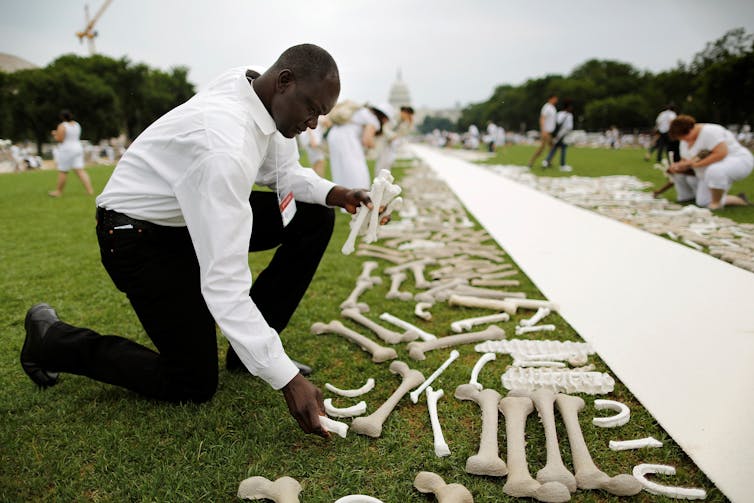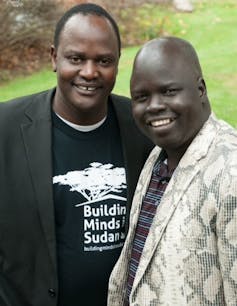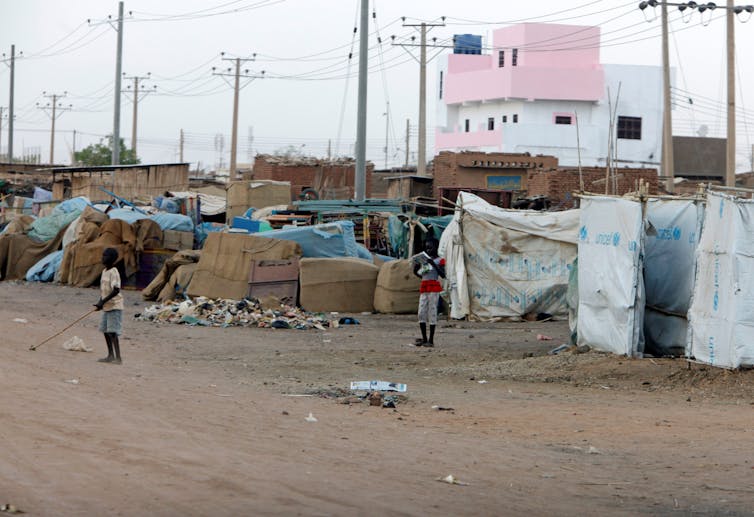Lost and found in upstate New York: 'Lost Boys' nonprofits latch onto a new objective closer to home
- Written by Susan Appe, Assistant Professor of Public Administration, University at Albany, State University of New York
Nonprofits help immigrants and refugees who settle in the U.S. in many ways. They encourage naturalized newcomers to become citizens, for example, and advocate for more humane detention[1] conditions.
We are scholars who research why people give their money[2] to, and volunteer for, what they believe to be good causes[3], including giving out of grief[4]. We became interested in what happens when refugees themselves start their own nonprofits.
The organizations we studied began as personal projects of the founders. Most of these groups support educational efforts in the childhood villages of the Sudanese exiles known as Lost Boys[5] in what now is South Sudan. As the political climate around immigration and refugees[6] intensifies, we find that these groups are beginning to play new roles as platforms that highlight the contributions refugees are making to their local communities here in the U.S.
 Activist John Dau, a former Lost Boy, taking part in an art project that raised awareness about genocide and mass atrocities.
Reuters/Jonathan Ernst
Activist John Dau, a former Lost Boy, taking part in an art project that raised awareness about genocide and mass atrocities.
Reuters/Jonathan Ernst
Lost Boys’ international nonprofits
The Lost Boys of Sudan were traumatically separated from their families as children during the country’s second civil war which started in the late 1980s and went until 2005. They lived in refugee camps in neighboring Ethiopia and Kenya for a decade.
In 2000, some 3,800 Lost Boys were resettled in the U.S.[7] through a program implemented by the U.S. government and United Nations Human Rights Commission. Lost Boys were resettled in dozens of U.S. cities[8], including Seattle and Boston, as well as in cities in upstate New York like Syracuse and Rochester.
Many of these resettled refugees are now adult U.S. citizens who have returned to visit to their homeland in South Sudan[9]. Their experiences on these trips sparked an interest in starting several small international nonprofits.
For example, Sebastian Maroundit and Mathon Noi[10], two cousins who fled Sudan as children and now live in upstate New York, founded the nonprofit Building Minds in South Sudan[11].
 Cousins Mathon Noi and Sebastian Maroundit arrived in the U.S. as Lost Boy refugees.
Sweet Image Photography/Marisa Poselovich, CC BY-NC-SA[12][13]
Cousins Mathon Noi and Sebastian Maroundit arrived in the U.S. as Lost Boy refugees.
Sweet Image Photography/Marisa Poselovich, CC BY-NC-SA[12][13]
Both were less than 10 years old when war came to their village and separated them from their families. They fled Sudan to refugee camps where they spent years before getting settled in Rochester.
After their first trip to South Sudan in 2007 to visit their surviving family members, they returned wanting to help their village and created Building Minds.
Its mission[14] is “to provide educational opportunities for villagers in the Republic of South Sudan.” Like many small nonprofits, Building Minds raises money by tapping into donations from private individuals, as well as local Rotary clubs and churches.
The nonprofit built, at the cost of about US$304,000 fundraised over the course of several years, a new school in 2015[15] that serves over 900 boys and girls in their former village and works in conjunction with government to run it. It is currently the largest primary school in South Sudan.
It’s just one of several similar nonprofits based in upstate New York, all of which are volunteer-run and small-scale. Most rely on annual budgets of less than $250,000, which average around $50,000. Like Building Minds, these nonprofits tend to be fairly personal projects, often with only the founders and board members doing the work and no paid staff.
Other examples include HOPE for Ariang Foundation[16] and South Sudan Initiatives[17], which are both based in Syracuse. These international nonprofits started by Lost Boys are good examples of a tradition of giving sometimes called “diaspora philanthropy[18],” the transfer of private donations back to a country of origin for immigrants and their descendants.
This form of giving is growing increasingly important[19] as governments spend less on development aid[20] and their assistance priorities change.
 Children playing in South Sudan.
Reuters/Mohamed Nureldin Abdallah
Children playing in South Sudan.
Reuters/Mohamed Nureldin Abdallah
An obligation to support education
These organizations mostly serve Lost Boys’ childhood villages in what now is South Sudan through education projects, including building schools and teacher training. About a tenth of the 105 small international nonprofits active in upstate New York registered with the IRS were founded by Lost Boys.
We found that Lost Boys start these international nonprofits out of an obligation they feel to remember and commemorate their families in South Sudan through development projects in their home villages. Establishing a nonprofit to serve their homelands became a way in which they make meaning of their own losses and struggles[21], and those of their families.
The transition from being a Lost Boy refugee to a U.S. citizen, who is educated and employed, includes emotional struggles such as depression or anxiety, and the stress of not knowing whether or not their families in Sudan survived.
The Lost Boy founders consider education as a key to their emotional survival. That’s reflected in the goals of many of the nonprofits these Lost Boys founded: The opportunity to gain an education is woven into all aspects of the nonprofits including their mission statements and development priorities.
A new role?
Amid the Trump administration’s restrictions on immigration and refugee arrivals[22], these nonprofits are beginning to embrace a broader objective: highlighting the contributions that the Lost Boys, and refugees more generally, make to their local communities.
In particular, through local speaking engagements Lost Boys not only are garnering support for their international projects, but are sharing their stories to audiences that need to witness how a refugee has made a good life for himself in their community.
This kind of message from refugees will show more Americans that refugees value the opportunities that they have had in the U.S. “What I have learned in my life in the U.S. is that education is life,” Maroundit explained. He believes that “education could lift the children in my village as my education in America has done for me.”
Through the work of these international nonprofits, the Lost Boys who founded them and their local supporters are poised to inform their communities about the contributions refugees are making in the U.S.
References
- ^ advocate for more humane detention (doi.org)
- ^ why people give their money (scholar.google.com)
- ^ good causes (hubertproject.org)
- ^ giving out of grief (en-socialwork.tau.ac.il)
- ^ Lost Boys (www.rescue.org)
- ^ political climate around immigration and refugees (www.npr.org)
- ^ In 2000, some 3,800 Lost Boys were resettled in the U.S. (uic.pure.elsevier.com)
- ^ resettled in dozens of U.S. cities (www.rescue.org)
- ^ South Sudan (www.bbc.com)
- ^ Sebastian Maroundit and Mathon Noi (www.byuradio.org)
- ^ Building Minds in South Sudan (www.bmiss.org)
- ^ Sweet Image Photography/Marisa Poselovich (sweetimagephotography.com)
- ^ CC BY-NC-SA (creativecommons.org)
- ^ mission (www.bmiss.org)
- ^ new school in 2015 (www.bmiss.org)
- ^ HOPE for Ariang Foundation (hopeforariang.org)
- ^ South Sudan Initiatives (www.southsudaninitiatives.org)
- ^ diaspora philanthropy (www.migrationpolicy.org)
- ^ increasingly important (onlinelibrary.wiley.com)
- ^ governments spend less on development aid (link.springer.com)
- ^ own losses and struggles (onlinelibrary.wiley.com)
- ^ restrictions on immigration and refugee arrivals (theconversation.com)
Authors: Susan Appe, Assistant Professor of Public Administration, University at Albany, State University of New York

